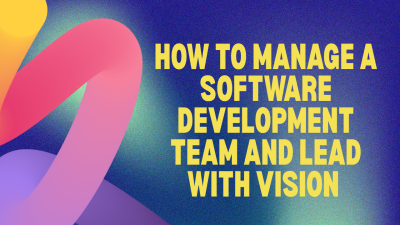As someone who has spent a good portion of my career working in business development, I can tell you that technical knowledge and industry know-how are just part of the equation. The key to scaling a business successfully lies in the soft skills and strategic mindset that drive growth. That’s where business development skills come into play.
But what does it take to train your team on these critical skills? After years of learning and teaching these techniques at Qtec Solution Limited, I’ve found that it’s not just about theory, it’s about hands-on practice and a mindset that encourages growth and collaboration. In this blog, I’m going to share how I approach developing business development skills in teams and how you can do the same.
Table of Contents
Building a Growth Mindset
To truly scale, a growth mindset is essential. It’s not just about executing tasks, it’s about thinking big, being adaptable, and pushing past the limits. Here’s how I approach cultivating this mindset in my team:
- Encouraging Strategic Thinking: One of the first things I do is to get my team to think about the “why” behind their work. Every action should be driven by a bigger strategy. Whether it’s generating leads, closing sales, or building partnerships. Teaching the team to connect their tasks to the overall company goals really helps them understand the bigger picture.
- Fostering Adaptability: The business world is ever-changing, and that’s a big challenge for any team. By instilling a sense of adaptability, I help my team tackle unexpected changes with confidence, rather than stress. Whether it’s a sudden market shift or a pivot in strategy, flexibility is key.
- Building Confidence in Decision-Making: Confidence is crucial for business development. I encourage my team to take ownership of their decisions. They need to be comfortable with risk-taking and learn how to analyze situations critically. It’s about trusting their instincts and becoming more assertive when opportunities arise.
Effective Networking
In business development, relationships matter more than you think. My success has always been tied to the strength of my network. Here’s how I train my team to build and leverage connections:
- Targeted Networking: Not all networking events are equal. I guide my team to identify and attend the events that align with our goals, whether it’s reaching out to potential clients or finding key industry partners. Knowing who to network with and how to make those connections meaningful is a vital skill to instill.
- Communication and Rapport-Building: Whether it’s an introductory email or a casual chat at an event, the ability to build rapport quickly is invaluable. I work with my team to ensure they approach networking with empathy and genuine interest. It’s not just about handing out business cards; it’s about nurturing relationships for the long haul.
- Follow-Up Strategy: I can’t tell you how many times I’ve seen missed opportunities simply because of poor follow-up. Teaching my team to craft personalized follow-up messages, based on the conversations they’ve had, is crucial. Regularly checking in with people they’ve met helps keep the relationships alive. This follow-up is a crucial part of business development skills, as it allows my team to convert short-term conversations into lasting business relationships.
Understanding Client Needs
One of the most important aspects of business development is understanding what your clients truly need. Here’s how I coach my team to approach this:
- Active Listening: This skill has been a game-changer for me, and I know it’s just as important for my team. I emphasize the power of active listening in all client interactions. It’s not just about hearing the words, they need to truly understand underlying pain points, challenges, and desires. I coach my team to be curious and dig deeper when speaking with clients. By strengthening these business development skills, they can better identify the specific needs of our clients and offer tailored solutions.
- Personalizing Solutions: One-size-fits-all doesn’t work in business development. By helping my team focus on personalizing each proposal, we make sure that we are addressing the exact needs of our clients. It’s a critical part of building trust and showing our clients we’ve truly heard them. Personalization is one of the business development skills that help create stronger, long-lasting client relationships.
- Client-Centric Thinking: Encouraging my team to always think from the client’s perspective has had a massive impact. I constantly ask them to consider, “If I were the client, would this solution work for me?” It helps foster empathy, and at the same time, it leads to better decision-making when offering services or solutions. Cultivating these business development skills ensures that my team is always focusing on creating value for the client.
Negotiation Tactics
Negotiation is where business development gets real. Over the years, I’ve learned how to approach these conversations with both confidence and empathy. Here’s how I train my team on negotiation skills:
- Preparing for Success: Before jumping into any negotiation, preparation is key. I teach my team how to thoroughly research the other party. The more they know about the client, the better they can tailor their approach. A prepared negotiator always has more leverage.
- Building Win-Win Situations: I emphasize the importance of collaborative negotiations. It’s not about “winning” or “losing”; it’s about creating a deal that satisfies both parties. I encourage my team to always think about how they can help solve problems for the client while still achieving business goals.
- Being Calm Under Pressure: Business development often involves high-stakes conversations. I work on helping my team stay calm, no matter how tense the situation gets. This emotional regulation is essential in keeping the discussion focused on finding solutions rather than getting bogged down in emotions.
Managing Relationships with Clients
Managing relationships with both internal and external clients is a huge part of business development. Here’s how I make sure my team excels in this area:
- Transparent Communication: I always stress the importance of clear and honest communication. Clients need to know the truth about progress, challenges, and potential risks. I guide my team to always be upfront, even when it’s difficult, because honesty builds trust over time. These business development skills are vital in helping my team establish open communication channels that strengthen client relationships.
- Building Long-Term Partnerships: It’s easy to close a sale, but what about the relationship after that? I teach my team to focus on long-term partnerships, not just one-time wins. Regular check-ins, offering additional value, and continuing to understand the evolving needs of our stakeholders help maintain strong, lasting relationships. This is an essential part of business development skills that keeps relationships fruitful well beyond the initial deal.
- Conflict Management: Conflicts with stakeholders are inevitable. I help my team stay level-headed, address issues head-on, and find solutions that are mutually beneficial. Teaching them to approach conflicts with a mindset of resolution, rather than escalation, is crucial to maintaining positive, productive relationships. These business development skills are vital in turning conflicts into opportunities for growth.
Performance Metrics
Tracking progress is essential for growth. Here’s how I ensure my team understands the importance of measuring success:
- Setting Clear KPIs: I believe that without clear KPIs, it’s hard to know if you’re truly scaling. I make sure my team knows what key performance indicators (KPIs) they’re working toward. These include lead generation, conversion rates, and customer retention metrics. Having clear goals helps everyone stay focused.
- Analyzing Data: It’s not enough to just have KPIs; my team must also learn how to interpret the data behind those numbers. I encourage them to dig deep into performance reports to understand why something worked or didn’t. This data-driven approach allows us to fine-tune strategies and improve results.
- Celebrating Milestones: It’s important to celebrate wins, no matter how small. I teach my team that acknowledging their progress is just as crucial as reaching the final goal. It builds momentum and keeps everyone motivated throughout the process.
Enhancing Presentation Skills
Effective presentation skills are essential for business development. Whether it’s presenting to a client, pitching an idea to investors, or speaking at a networking event, the ability to convey ideas clearly and persuasively is invaluable.
- Creating Engaging Presentations: I guide my team to craft presentations that not only provide valuable information but also engage the audience. Good presentations use storytelling techniques, clear visuals, and concise messaging to convey complex ideas simply. Developing these business development skills allows my team to effectively communicate our business value to potential clients and stakeholders.
- Confidence in Delivery: A great presentation is only effective if it’s delivered with confidence. I encourage my team to practice their presentations repeatedly, ensuring they’re comfortable with the material. This boosts their confidence, helping them communicate more effectively and leave a lasting impression.
Mastering Time Management
In business development, time is one of the most precious resources. Efficiently managing it is critical to achieving high performance and scaling operations.
- Prioritizing Tasks: I teach my team to distinguish between urgent and important tasks, ensuring they focus their efforts on activities that drive the most value for the business. By honing their business development skills in time management, my team can ensure that key business-building activities take precedence.
- Setting Deadlines and Milestones: I work with my team to break larger goals into smaller, manageable tasks with clear deadlines. This creates a roadmap that allows us to track progress and adjust as needed. Strong business development skills in time management ensure that we stay on course and deliver timely results.
Building Cross-Functional Relationships
Business development isn’t just about client relationships; it’s also about working effectively with internal teams, such as marketing, operations, and product development.
- Collaboration Across Departments: I train my team to actively communicate and collaborate with other departments. Understanding how each part of the organization works helps them align strategies and maximize the impact of their business development efforts. These business development skills are critical for ensuring that every team member is on the same page and working towards shared goals.
- Leveraging Internal Resources: I encourage my team to tap into the expertise of colleagues across the company. Whether it’s leveraging the marketing team for content or the product team for insights, these business development skills help us develop well-rounded strategies that drive growth.
Leveraging Technology and Tools
The right tools can greatly enhance business development efforts. From CRM systems to automated outreach tools, technology can streamline processes and make the team more efficient.
- Using CRM Systems Effectively: I train my team to use customer relationship management (CRM) tools to track leads, follow up on sales opportunities, and store valuable client data. By honing their business development skills in using CRM systems, they can stay organized, track progress, and ensure no opportunity is missed.
- Embracing Automation: I also encourage my team to embrace automation tools for email campaigns, social media outreach, and scheduling. These business development skills in using technology allow us to save time, focus on high-value tasks, and increase efficiency in our outreach efforts.
Tracking and Measuring ROI
Measuring the return on investment (ROI) for business development activities is crucial for understanding what’s working and what isn’t. Without this, it’s difficult to optimize efforts for maximum impact.
- Evaluating Campaigns and Initiatives: I make sure my team consistently tracks the success of business development campaigns, using metrics such as lead conversion rates, customer retention rates, and revenue growth. By sharpening their business development skills in data analysis, they can see which tactics yield the best results and refine strategies accordingly.
- Continuous Improvement: I encourage a culture of constant learning and improvement. After evaluating each campaign, I help my team assess what worked, what didn’t, and how we can optimize going forward. These business development skills ensure that our approach continuously evolves to meet new challenges and market demands.
Building Resilience in Sales
Sales can be tough, and rejection is inevitable. Helping your team build resilience is crucial to maintaining momentum even when things don’t go as planned.
- Learning from Rejection: I teach my team that every rejection is an opportunity to learn. Instead of getting discouraged, they should analyze what went wrong, adjust their approach, and keep going. This mental resilience helps them stay motivated and continue to refine their techniques, making them more successful in the long run.
- Maintaining Positivity: I emphasize the importance of staying positive, even during tough times. Encouraging a positive outlook helps keep the team engaged and motivated, which ultimately boosts their performance and persistence in chasing leads and closing deals.
Developing Negotiation Strategies
Negotiation is an art that requires practice, patience, and a deep understanding of both the client’s and the company’s needs.
- Win-Win Mindset: I train my team to approach negotiations with a collaborative mindset rather than a combative one. It’s not just about getting the best deal for the company but finding a solution that benefits both parties. This mindset fosters long-term relationships and positions the company as a trusted partner, making future negotiations easier.
- Handling Objections Gracefully: I teach my team not to fear objections, but to embrace them as opportunities to address concerns and add more value. By handling objections with confidence and grace, they are able to maintain a positive relationship with clients while steering the negotiation toward a mutually beneficial outcome.
Conclusion
Training your team on business development skills isn’t about simply providing theoretical knowledge. It’s about fostering the right mindset, communication, and strategies that will drive growth for both the team and the company.
By focusing on strategic thinking, building relationships, honing negotiation skills, and measuring success, you can build a business development team that not only meets goals but exceeds them.
The more you invest in these skills, the more you’ll see them scale your business, just as I’ve seen in my own journey. So, let’s make sure you and your team are ready to grow, adapt, and succeed.
Frequently Asked Questions
Why are business development skills important?
Business development skills are crucial because they enable your team to build lasting relationships, close deals effectively, and align the company’s goals with the needs of clients and stakeholders.
How can I improve my team’s business development skills?
To improve your team’s business development skills, focus on practical training, mentorship, real-world problem solving, and encouraging strategic thinking. Cultivate communication and negotiation techniques through hands-on experience.
What are some examples of business development skills?
Some key business development skills include networking, active listening, negotiation, relationship management, and performance tracking. These skills help teams successfully navigate challenges and opportunities.
How do business development skills impact company growth?
These skills directly contribute to business expansion by enabling teams to generate leads, convert clients, and build long-term partnerships. They also play a key role in adapting to new market trends and client needs.
Can business development skills help me advance in my career?
Absolutely! Mastering business development skills can open doors for leadership roles, enhance your strategic thinking, and make you a key player in driving company success.
How do business development skills impact customer retention?
Business development skills play a crucial role in customer retention by helping your team build strong, lasting relationships with clients. Skills such as active listening, personalized communication, and understanding client needs ensure that clients feel valued and supported, leading to higher satisfaction and loyalty.
Can business development skills help in expanding into new markets?
Absolutely! Business development skills are essential when expanding into new markets. By leveraging skills such as market research, networking, and strategic partnerships, your team can identify opportunities, understand local dynamics, and build relationships that pave the way for successful market entry and growth.




